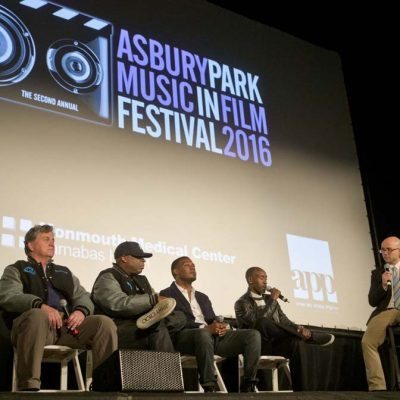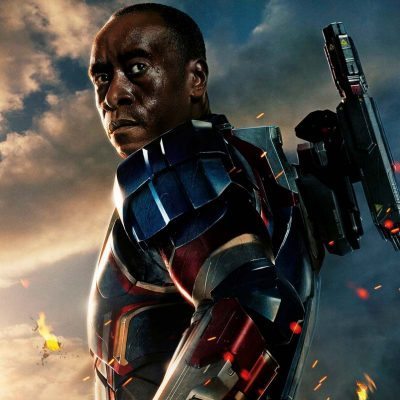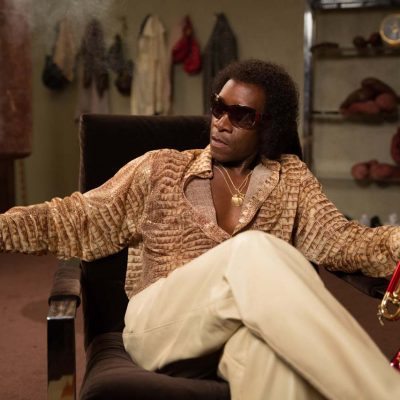Don Cheadle’s breakthrough performance as Miles Davis defies storytelling convention in search of a deeper understanding of the jazz legend
by Matt Scanlon, with reporting from Susan Hornik
In a scene as telling of the tenor of Don Cheadle’s portrayal of Miles Davis in the biopic Miles Ahead as it is of the jazz performer himself, a fictional Rolling Stone writer strides to the door of Davis’s home and blithely tells him, “My name is Dave Brill, and I’m here to do your comeback story.”
Brill is then promptly punched in the face.
The fictional moment’s setting is the late 1970s, when Davis—whose Kind of Blue was already considered the greatest jazz album of all time and who’d played pivotal roles in the development of bebop, third stream, modal jazz, post-bop, and jazz fusion—was uncharacteristically stilled in performance and production, and when his temperament, always unpredictable, was veering into that of a volcanic hermit, an aspect Cheadle had no intention of shying from.
World premiering at the 53rd New York Film Festival and a centerpiece of the Asbury Park Music in Film Festival in April, Miles Ahead was directed by Cheadle (his directorial debut), with a screenplay by the star, along a team of writers that included Wicked City writer Steven Baigelman. Together, they offer a whirling, time-traveling, unflinching look at an artist who was generous, romantic, acerbic, and infuriating, in roughly equal amounts. It was theater-released on April 1.
The idea of a film tribute to Davis had been percolating among his family members since the artist’s death in 1991, and shortly after his induction into the Rock ‘n Roll Hall of Fame in 2006, Cheadle was already being considered for the role…more than considered in fact.
“Vince Wilburn [Jr.], Miles’s nephew, just announced that I was going to play him when Miles was inducted…said that there was going to be a movie about his life and that I was going to play him,” Cheadle recalled with a laugh at the press conference for the NYFF premiere. “It was kind of a pronouncement.”
That coronation of sorts started an idea ball rolling that over a number of years encompassed everything from standard biopic cradle-to-grave treatment to a collection of seemingly unrelated, stitched-together moments—and budgets that rose as high as $20 million before landing at $8.5 million.
“I just wasn’t interested in doing a story in a standard way, though, particularly for this artist,” Cheadle explained. “This singular artist who was always about trying to do it differently than it had been done before. I wanted to make a movie that I thought Miles Davis would’ve wanted to star in. I asked the family, and they thought that he would’ve preferred something more dynamic, too.”
Eschewing the “cheap psychology” of the standard biopic, as Rolling Stones’ film reviewer Peter Travers memorably put it in his review, the film instead is a series of episodes, at times defying timeline and storyline convention, but in the end akin to much of Davis’s jazz writing and many of his performances— in which genres are blended to produce a poetic whole. Film moments are highlighted by the young performer being beaten by cops, his famously complicated relationship with first wife Frances Taylor (memorable played by Emayatzy Corinealdi), and a gun-toting dispute with record management executives.
A fan of jazz since he was in middle school, Cheadle played sax from fifth grade until he was a senior in high school, and also sang with a jazz choir. In pursuit of a realistic portrayal of Davis, the California Institute of the Arts graduate (BFA in Acting) learned how to play the trumpet for the role, along with mastering Davis’s whispered voice. At a Q&A for a screening of Miles Ahead at the Arclight Theatre in Los Angeles, he noted that he even asked cast members and anyone on set to relate to him as if he were the artist, even after shooting had been completed for the day.
“It wasn’t like, ‘Don’t anybody call me Don…I’m Miles all day today,’” he explained. “I just wanted to stay as close to the character as I could. Miles was someone who once wondered, literally, ‘Is it cooler to tap my foot inside my shoe or tap my whole shoe?’ Cool has a lot of different ways that it gets displayed, and I think it’s not about worrying about being cool at the end of the day that matters…it’s just being you.”
Cheadle had been influenced by Davis’s music for many years.
“It’s definitely been part of my whole life, starting very early. The music of my youth—my parents listened to it…and once I became aware, I sought it out and wanted to understand,” adding that he hopes to draw in a new generation of Davis lovers with the film, noting also that rapper Kendrick Lamar and jazz saxophonist and composer Kamasi Washington are among his recent favorites.
Though his first film role was in 1984’s 3 Days, the Kansas City, Missouri-born son of teacher
“I just wasn’t interested in doing a story in a standard way, particularly for this artist,” Cheadle explained. “This singular artist who was always about trying to do it differently than it had been done before. I wanted to make a movie that I thought Miles Davis would’ve wanted to star in.”
Bettye (née North) and clinical psychologist Donald Frank Cheadle, Sr. gained global acclaim playing hotel manager Paul Rusesabagina in 2004’s Hotel Rwanda, a performance that earned him an Academy Award nomination for Best Actor. He currently stars in the Showtime series House of Lies (now in its fifth season) as Marty Kaan, the charming, if immoral, head of the consulting firm Kaan & Associates, for which he took home a 2013 Golden Globe for Best Actor in a TV Series Comedy or Musical. There have been dozens of other roles, of course, in films such as Devil in a Blue Dress (1995), Boogie Nights (1997), Traffic (2000), Ocean’s Eleven and its two sequels (2001, 2004, and 2007), Iron Man 2 (2010), Iron Man 3 (2013), and Avengers: Age of Ultron (2015). He’s also set to reprise his role of James “Rhodey” Rhodes in Captain America: Civil War this year.
He and his partner, veteran actor Bridgid Coulter (Rosewood and this year’s HBO series Westworld), have two children, a daughter and son (born in 1997 and 1995, respectively






